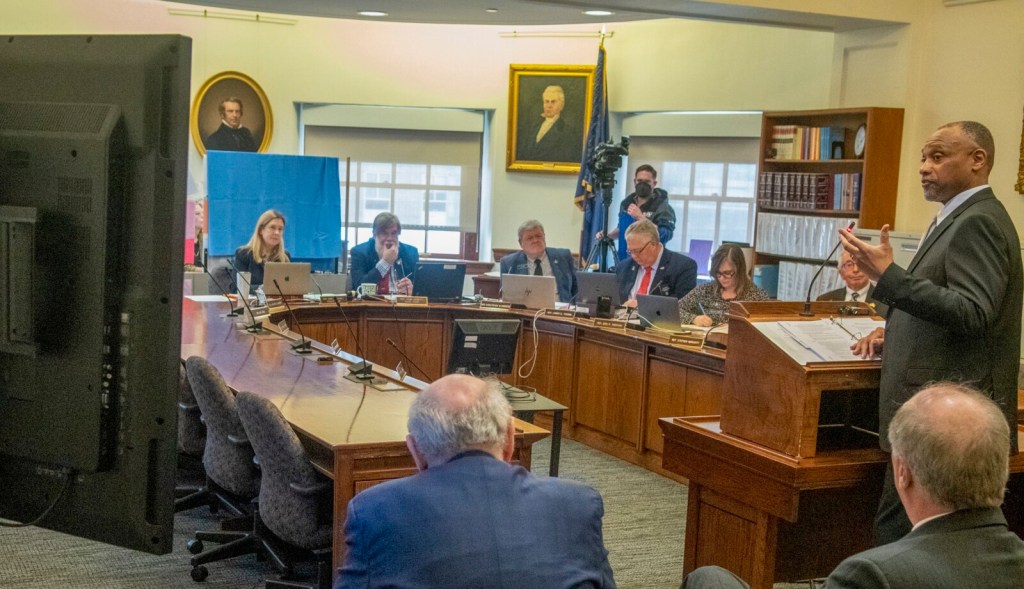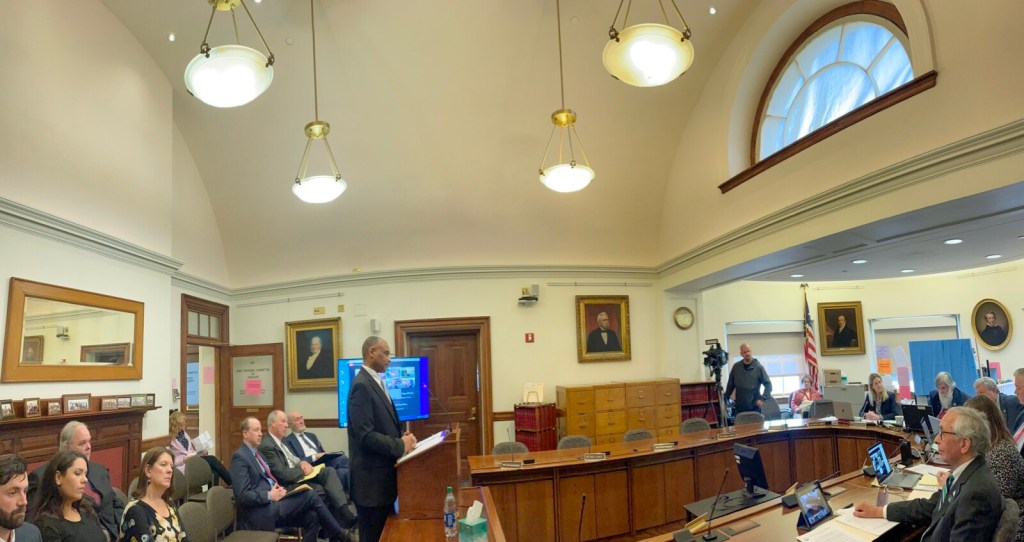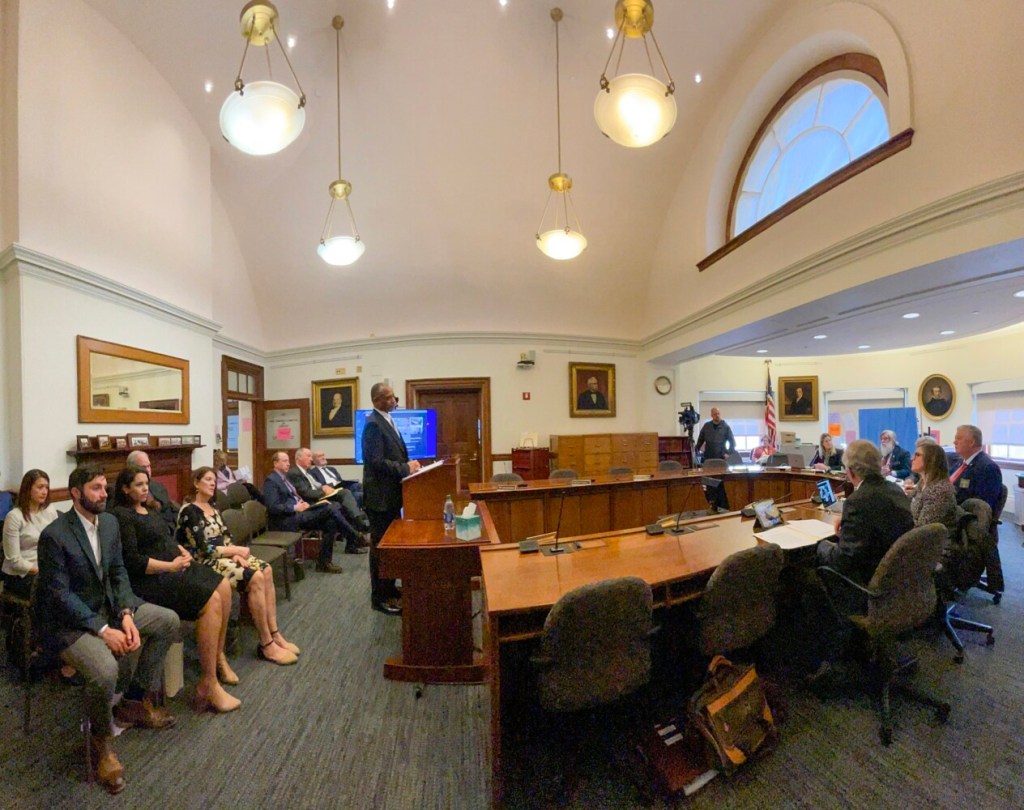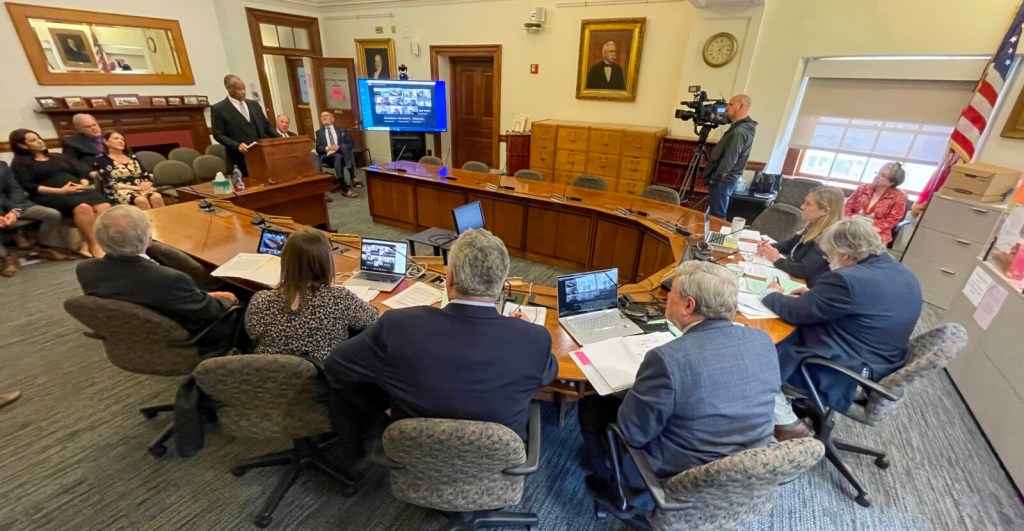AUGUSTA — A Lewiston judge who grew up experiencing Jim Crow laws firsthand took one step closer Friday toward becoming the first Black justice to serve on the state’s highest court.
The judiciary committee of the Maine Legislature voted unanimously to recommend confirmation of Rick E. Lawrence, 66, to be associate justice of the Maine Supreme Judicial Court.
His nomination by Gov. Janet Mills will go before the Maine Senate for final vote.
Since 2000, the Portland resident has presided primarily in courts within Androscoggin, Oxford and Franklin counties. He also serves as deputy chief judge of the Maine District Court.
Lawrence gained the distinction as the first African American to be appointed to the bench in Maine.
Appearing Friday before the committee at the State House, Lawrence said his parents, whose limited opportunities prevented them from finishing high school, moved to New England from the deep South after World War II.
Lawrence was raised in Great Barrington, Massachusetts, the birthplace of W.E.B Du Bois, who distinguished himself as the first African American to be awarded a doctorate degree by Harvard University and who was one of the co-founders of the National Association for the Advancement of Colored People.
“When I was a preschooler during family trips down South to visit relatives, I got a glimpse of what life had been like for them,” Lawrence said of his parents.

District Court Judge Rick Lawrence speaks before the Judiciary Committee on Friday during his confirmation hearing to become an associate justice on the Maine Supreme Judicial Court at the Maine State House in Augusta. Joe Phelan/Kennebec Journal
“Despite my tender years, I still vividly recall my parents being denied service at restaurants on the interstates, our family being relegated to barely functioning colored-only restrooms at rest stops, and my parents having to search for a motel where our family would be allowed to stay overnight.”
Growing up in the 1960s, Lawrence said, “I was emotionally transfixed and psychologically affirmed as I watched the boycotts, sit-ins, civil disobedience, protest rallies and marches that were employed by the Civil Rights Movement. At the same time, I was offended by the vehement opposition to the movement and dismayed by the far too-often brutal retaliation against its proponents.”
Lawrence began to pay close attention to legal battles playing out in the justice system “that directly touch the lives of my family and other persons of color,” he said.
“Those events shaped my impression of lawyers and the courts and fostered my view of both as powerful forces that could play a positive role in people’s lives,” he said. “My interest in the law and thoughts about someday becoming a lawyer grew out of those roots.”

Co-chair Rep. Thomas Harnett, who represents Gardiner and Farmingdale, sits Friday during a confirmation hearing for District Court Judge Rick Lawrence before the Judiciary Committee in the Maine State House in Augusta. Lawrence is being considered for a seat on the Maine Supreme Judicial Court. Joe Phelan/Kennebec Journal
His parents impressed on him the importance of a good education.
“So, in my freshman year of high school, when a guidance counselor told me that because I was Black, I should pursue a trade of some sort rather than thinking about going to college,” he said. “My parents made certain that I understood never to let myself be constrained by someone’s race-based backward thinking.”
His parents worked hard to provide him with that opportunity which they were denied, his mother taking a series of waitressing jobs, his father working as head chef at a destination resort, all the while modeling for Lawrence that hard work was an “essential element in achieving any worthwhile goal.”
His parents also made sure he understood that “no one owes me anything. And nothing substantive was never just handed to me. Their hard work, sacrifice and encouragement made it possible for me to attend Yale University.”
Toward the end of his first year in college, Lawrence began to consider law school, he said. But, during his sophomore year, his father was killed in a car crash.
Lawrence said his plans suddenly changed to finding work after graduation so he could start earning an income and pay his student loans.
He did that, working a series of jobs in sales for a national home products corporation then in insurance management and finally as a claims administrator for a national insurance company.
It was there his interest in law was rekindled, he said, when he realized he enjoyed contract analysis sorting out how policy provisions work. That realization led to his enrollment at Harvard Law School.

District Court Judge Rick Lawrence, left, shakes hands with co-chair Rep. Thom Harnett, D-Gardiner, before his confirmation hearing Friday before the Judiciary Committee at the Maine State House in Augusta. Joe Phelan/Kennebec Journal
Prior to his appointment to the Maine District Court, Lawrence worked as an attorney and vice president and managing counsel at Unum and as an associate at Pierce Atwood law firm.
“I’ve been afforded a broad range of life, business and professional experience to draw from in my dealings with the people and issues I’ve encountered while on the bench,” Lawrence said of his tenure as a judge. “I believe that experience and my work ethic will help me be open-minded, reflective, pragmatic, and fair when addressing the ever-expanding spectrum of issues that come before the (Maine Supreme Judicial Court, also known as the) Law Court.”
As a justice on the state’s highest court, Lawrence said he hopes to try to fill part of the void left by former Justice Ellen Gorman, who stepped down earlier this year. Gorman served as a liaison between the high court and the Maine Family Court Division. As a Maine District Court judge, Lawrence has been presiding over family court matters.
Confirmation of Lawrence’s nomination was urged Friday by members of the public who included criminal defense attorneys, a community resource director, a former county sheriff, a domestic violence social worker and a former law student.

Co-chair Sen. Anne Carney, D-Cape Elizabeth, runs the confirmation hearing Friday for District Court Judge Rick Lawrence, who is being considered for a seat on the Maine Supreme Judicial Court, at the Maine State House in Augusta. Joe Phelan/Kennebec Journal
Longtime Lewiston criminal defense attorney Leonard Sharon said most of his clients over the past five decades have been people of color. When they enter a courthouse or a courtroom in Maine, they don’t see people who share their racial identity, he said. But when his clients appear before Judge Lawrence, Sharon said they get the justice they deserve, not because of Lawrence’s face, but because of his jurisprudence.
“He sits in a court where daily lives are affected: evictions, divorces, child custodies, protection from abuse, divorces; bail, sentences on misdemeanors, pleas, pro ses (people representing themselves,) ” Sharon said.
“Innumerable lives are affected every day in that court,” he said. “And what goes beyond the color of this man’s skin is that he’s a terrific judge, a great judge. If I were blind and I didn’t know what color Judge Lawrence’s skin was and I would walk into his courtroom, I would walk out of there knowing that justice is being done. You can hear the fairness in his voice when he addresses the litigants. He talks to them because he knows their lives are on the line.”
Lawrence has gone into the Lewiston immigrant community in an effort to educate people from other countries about Maine’s justice system, said Auburn resident Fatuma Hussein, who serves as the executive director of the Immigrant Resource Center of Maine. “Judge Lawrence has done a lot of work around access to justice for people who speak other languages,” she told the committee.
Courtney O’Brien, violence intervention program manager at Safe Voices, a nonprofit agency whose mission is to support and empower those affected by domestic violence, praised Lawrence for his “firm and fair” approach to presiding over domestic violence court cases.
Susan Faunce, president of Maine Trial Lawyers Association, said her group’s members “overwhelmingly rated Judge Lawrence highly as to his skill, competence and temperament.”
They said he was “smart, thorough and compassionate. And he was an excellent addition to the Law Court. He has stellar credentials,” Faunce said. “Others said judge Lawrence is an excellent writer, producing well-reasoned and carefully crafted opinions. Judge Lawrence has consistently been highly rated by our members since he became a district court judge in 2000.”
She also pointed to his efforts as deputy chief judge of the Maine District Court during the pandemic to ensure the state’s courthouses and courtrooms were safe and functional.
Frank Bishop Jr., president of the Maine State Bar Association’s Board of Governors, said, “You won’t be surprised to hear that the results of Judge Lawrence’s 2020 evaluation show that Maine attorneys find him to be one of the best judges in the state of Maine. They describe him as highly intelligent, knowledgeable of law and procedure, and professional in his dealings with attorneys and clients alike. Lawyers who appear before Judge Lawrence consider him fair, compassionate and kind to all.”
Copy the Story LinkSend questions/comments to the editors.













Success. Please wait for the page to reload. If the page does not reload within 5 seconds, please refresh the page.
Enter your email and password to access comments.
Hi, to comment on stories you must . This profile is in addition to your subscription and website login.
Already have a commenting profile? .
Invalid username/password.
Please check your email to confirm and complete your registration.
Only subscribers are eligible to post comments. Please subscribe or login first for digital access. Here’s why.
Use the form below to reset your password. When you've submitted your account email, we will send an email with a reset code.